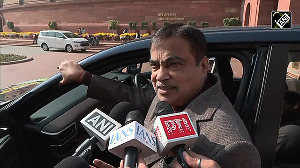Vijay Keshav Gokhale’s tenure as foreign secretary promises to guide India’s external affairs along paths never taken before, says K P Nayar.

The elevation of Vijay Keshav Gokhale to the post of foreign secretary has been attributed in contemporary diplomatic folklore to the role he played in resolving the Doklam issue in 2017 when he was India’s ambassador in Beijing.
Such a view does great disservice to the experience and history of service of a rare diplomat whose tenure as foreign secretary promises to guide India’s external affairs along paths never taken before.
Gokhale is only the third officer in the history of the Indian Foreign Service to have served in Taipei, Hong Kong and Beijing.
He is the only diplomat among these three to have become ambassador to China after a posting in Taiwan.
Vinod C Khanna, who was asked by Prime Minister P V Narasimha Rao to open the India-Taipei Association as New Delhi’s outpost in China’s renegade province, headed the pioneering entity only after he left the IFS.
Gokhale spent four years as New Delhi’s unofficial ambassador in Taiwan, the longest that any Indian official has spent in Taipei.
Taiwan is one of the unsung successes of “Make in India” and efforts to attract foreign investment.
It is rarely talked about because of a mistaken assumption that India’s engagement of Taiwan will annoy mainland China.
Taiwan’s so-called ministry of foreign affairs announced last month at the signing of a memorandum of understanding with India on the promotion of industry collaboration that over 100 Taiwanese companies have invested around $1.5 billion in India.
An increase in bilateral trade by 40 per cent between January and September 2017 has made India Taiwan’s 18th largest trading partner.
With such a booming economic relationship, the Narendra Modi government wants to come out of the closet about ties with Taiwan just as it shed the inhibitions of earlier dispensations in New Delhi about Israel and took Benjamin Netanyahu into its embrace.
Gokhale will have the grasp and confidence to initiate such a policy change.
Beijing’s ambassador in New Delhi called on Gokhale as soon as he returned from Taiwan to India in January 2007 and became the MEA’s point man on China, Japan and the two Koreas.
The envoy, who evolved an excellent working relationship for the next three years with this joint secretary for East Asia, told Gokhale that China had absolutely no problem with India’s dealings with Taiwan as long as such engagement was about business.
The choice of the new foreign secretary has much to do with the way Modi’s government has given a domestic and ethnic face to foreign policy by lavishing care on people of Indian origin abroad, addressing the consular challenges before the MEA and simplifying the passport procedures.
These policies cannot be taken forward by a proverbial mandarin with a stiff upper lip who has spent decades in chanceries overseas.
It needs someone who knows the workings of the Government of India beyond diplomacy and its endemic turf battles.
Gokhale is a rarity in the IFS, having spent 10 years of his service -- 14 years on paper -- in home postings.
Most of his contemporaries have stayed in India between three and five years during their entire career averaging about 35 years.
In domestic postings, Gokhale strayed from hardcore diplomacy into the finance division, understanding how the MEA budget is utilised, as director for vigilance, among others.
These stints will help him in being thrifty and in plugging possible sources of corruption.
As a resolution of the Doklam dispute acquired urgency with Modi’s impending travel to Xiamen in September, the prime minister made his ambassador in Beijing the “single point of contact” for the Chinese negotiators.
So, it is now forgotten that as high commissioner in Kuala Lumpur, he turned around relations with Malaysia -- which once viewed India with suspicion -- and instituted a bilateral strategic partnership even before Singapore.
Cooperation with Malaysia on counter-terrorism has put at least six dreaded Khalistanis from South East Asia in jails in Punjab.
Five months after Gokhale’s posting was formalised he ensured the opening of an Indian Cultural Centre in Kuala Lumpur.
Amidst the South East Asian leaders at the Republic Day parade, relations with Malaysia and Singapore are the most multi-dimensional for India in all of East Asia.
Photograph: @MEAIndia/Twitter.
K P Nayar reported from Washington as a foreign correspondent for 15 years.











